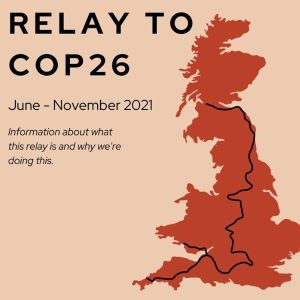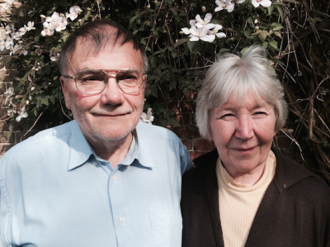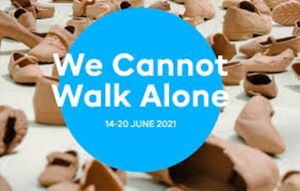NW NJPN Justice and Peace E Bulletin for July
The NW NJPN Justice and Peace E Bulletin for July covers a range of topics from Climate Change, Covid crisis funding, a tribute to Martha White, US Civil Rights activist, an article on the thorny issue of women priests, resources and diary dates plus an urgent action request to lobby your MP by the Reset the Debt campaign in advance of a parliamentary debate on 8 July.
Please read and pass on.
Best wishes
Anne O’Connor
NW NJPN Justice and Peace E Bulletin July 2021

NJPN E-Bulletin 27th June 2021
Dear Friends,
Another two weeks has flown past, and in that time we had Summer for a week, and then back to the cold weather again! Very much a sign that our climate doesn’t know what it is doing any more. Our lead article this week will be on the Climate and Environment. After the rather disappointing G7 Summit, and yes, we have some articles summing that up, I thought it important that we look at what is being done and said in Christian circles in the run-up to COP26.
We have an interesting Action of the Week concerning Piracy on the High Seas. Something that doesn’t directly affect most of us – but it is real, and it is still happening. Please read, and most importantly pray with, and support the seafarers, through Stella Maris.
Our Conference is rapidly approaching. This will be a really important Conference in the lead up to COP26 in November. If you are still thinking about it, but haven’t yet put your name down, please do so soon. Details are available through our website here. However, before filling in any forms or sending a cheque, please communicate with Geoff Thompson, the NJPN Administrator. Email address admin@justice-and-peace.org.uk or telephone 07365 838535.
All being well, the next e-bulletin will be out in two weeks time, the 11th July. If you have something you particularly want shared, please send it to:- ebulletin@justice-and-peace.org.uk. This email address is usually only monitored when the e-bulletin is being prepared, so please do not expect an immediate answer when sending anything.
God bless, and keep well,
Sharon (Editor)

NJPN Blog in ICN: Michael and Patricia Pulham – 60 years of campaigning against nuclear weapons
A special commemorative zoom event is planned by Christian CND to mark 60 years of its campaigning against nuclear weapons. It will take place on Monday 12 July at 7pm….
The event was originally scheduled to take place in Methodist Central Hall, Westminster, the location of the historic first meeting of the United Nations General Assembly in 1946. The first resolution it passed called for the elimination of nuclear weapons!
Link
https://www.indcatholicnews.com/news/42532

NJPN E-Bulletin 13th June 2021
Dear Friends,
This week, 14th – 20th June, is Refugee Week. Our Action of the Week and lead articles are all about refugees.
Pope Francis, back in May 2013, wrote the following:-
‘I would like to ask you all to see a ray of hope as well in the eyes and hearts of refugees and of whose who have been forcibly displaced. A hope that is expressed in expectations for the future, in the desire for friendship, in the wish to participate in the host society, also through learning the language, access to employment and the education of children. I admire the courage of those who hope to be able gradually to resume a normal life, waiting for joy and love to return to brighten their existence.
We can and must all nourish this hope!’
Please get involved this week if you can.
Other articles include comments on the G7 Summit, which will have taken place in Cornwall by the time you receive this e-bulletin.
We are continuing to take bookings for our Annual Conference, which takes place the 23rd – 25th July at the Hayes Conference Centre in Swanwick, Derbyshire. All the details and a booking form are available through our website here. Everyone is welcome and we are particularly keen on encouraging young people to attend. It is a first for me, and I am taking the family! If we can just sow some seeds in the younger generation about caring for our planet and people, the future of the world would look a lot more hopeful.
The next e-bulletin will be out around the 27th June. If you have any articles you want included, please send them to ebulletin@justice-and-peace.org.uk
God bless you and your loved ones,
Sharon (Editor)
NJPN E-Bulletin 14 June 2021
NJPN Column in the Catholic Universe: Aisling Griffin – Understanding Conflict Through Peace Education
I’ve often been in schools talking about Pax Christi’s work when I’ve been asked about a current conflict, such as the on-going situation in Palestine/Israel. I’ve been reflecting on, not only the need for education on conflict but also the things that make for peace.
Many schools may teach about Israel/ Palestine in lessons. However, this is not something all of us feel equipped to discuss and it can often be seen as too complex or difficult to talk about. Discussions and debates about how we see it reported it in the media, stories of conflict and discrimination and comments on social media, make it clear that we need to be equipped to enter into constructive conversations and dialogue. We need an understanding of what is happening in order to be able to work for a just peace. Below are some examples of resources that could be used to do this.
As peacemakers we must reflect on the wider context of conflict and peace education. Companies with factories in Britain produce components of the weaponry used in war and in violent crowd control against peaceful protestors. As a country exporting weaponry to oppressive regimes we need to reflect on our role in promoting and sustaining conflict around the globe. Some of these companies also go into or work with schools to promote science and technology. What are the ethics surrounding this? Should faith schools be inviting them in? Is this showing children and young people a balanced viewpoint and promoting peace?
In Palestine/Israel, and around the world, there are many people working nonviolently to promote a just peace. We rarely hear their stories. Educators, activists, Israeli conscientious objectors and Israeli/Palestinian communities, such as Neve Shalom/Wahat a Salaam, are all working for justice. There is no peace without justice. Let us work to promote these voices and narratives, to see the true cost of violence and war. By learning about the root causes of conflicts and ways in which to discuss them we can engage with them more fully and promote peace in our own lives and globally. Peace education enables us to do this.
As Pax Christi works in both peace education and supporting our partners working for a just peace in Palestine/Israel, we also need to continue to support each other in dealing with conflict and injustice.
See:
Pax Christi: https://paxchristi.org.uk/peace-education/secondary/workshop-resources/
Quakers in Britain: https://www.quaker.org.uk/resources/free-resources/teaching-resources-2
https://www.tes.com/teaching-resources/shop/QuakerPeaceEducation
Aisling Griffin is Pax Christi’s Education Worker.

NJPN Column in the Catholic Universe: Fr Rob Esdaile – Build Back Different
Next weekend (June 11-13) ‘Global Britain’ is hosting the G7 Summit in Cornwall. The gathering is not truly global, because invitations are limited to the richest industrialised nations, all of them in the Northern hemisphere (although our government has extended an invitation to India, Korea and Australia). However, it does offer a major opportunity for action, both on the economic crisis caused by the Covid-19 pandemic and on the ecological crisis which is the subject of the COP26 conference in Glasgow in November.
The slogan ‘Build Back Better’ has been floating around for the last six months or more. But the real question is: What do you mean by ‘better’? If you mean more of the same model of economic growth based on ever-increasing consumption, the same dependence on fossil fuels, the same throw-away culture which is clogging the oceans with single use plastics, the same supply chains that offshore our own carbon-footprint and keep so many living below the breadline – then all that will ensue is more deforestation, more exploitation of the poorest, more global warming, more turmoil.
‘Better’ has to mean ‘more sustainable’ – both ecologically (keeping below that 1.5 degree rise in global temperatures and reversing habitat destruction) and politically (creating more stable and just societies). ‘Better’ has to mean the redirection of the resources now devoted to war preparations to the fight to save our planet from our own worst actions.
‘Better’ has to mean greater global solidarity in facing both this and future pandemics: the swift supply of vaccines to the poorest nations (not least because, to coin a phrase, ‘no one is safe until all are safe’); and release of those same nations from the debts built up in fighting the virus and in shoring up their own economies.
But above all, ‘better’ has to be about having a renewed vision of the kind of world we seek and a willingness to campaign for it. That demands a Church with a better understanding of what it means to be a disciple of Jesus, a seeker after God’s Kingdom and divine justice (Mt 6.33). We Catholics have to be at the heart of the struggle to ‘build back better’, insisting that better means different – a kinder, cleaner, fairer Britain, global in our bridge-building where others would build walls.
Fr Rob Esdaile is parish priest of Our Lady of Lourdes, Thames Ditton.
23-25 July 2021 National Justice and Peace Network (NJPN) Conference: https://www.justice-and-peace.org.uk/conference/
NW NJPN E Bulletin for mid-June
An extra edition of the NW NJPN E Bulletin for mid-June features a wide range of resources for Refugee Week 14-20 June including a series of audio dramas from Counterpoint Arts by contemporary Kosovan and Balkan writers, available on Zoom plus news of a photographic series to echo this year’s theme ‘We cannot walk alone.’ Other news articles look at the horrific discovery of a mass grave at a residential school for indigenous children in Canada; German Cardinal Marx’s resignation regarding the Church’s ‘systemic failure’ on abuse; reports from JRS, CAFOD and LIfe on the Breadline. Joan Baez is honoured by the Kennedy Centre for performing Arts for her humanitarian and peace work over a long career. There are obituaries of Sr Isabel Kelly, campaigner against human trafficking, and broadcaster Peter France. Faiths4Change are offering fully funded places on an accredited course in Liverpool to explore climate change and carbon footprints and Green Christian announce a VI Form module based on Laudato Si’. Book reviews and diary dates complete a packed bulletin. Please read and pass on.
NW NJPN Justice and Peace E Bulletin mid June 2021
NJPN Column in the Catholic Universe: Phil Kingston – The Holy Spirit in our Mission
Pope Francis’ book’ Let Us Dream’ is one which brings me new life, principally because he places the Holy Spirit in a central role in our Church. This is something which I rarely find in the UK Church nor in other Churches in the materially rich countries.
However, this centrality abounds in the Churches of the poor countries. My perception is that we are still largely a Church of Christendom rather than one which reflects the Church of the first Christians as depicted in the Acts of the Apostles.
Francis constantly links this centrality of the Holy Spirit to peoples’ current concerns and to the major problems of the world. He skillfully focusses upon Catholic Social Teaching as a well-based way of responding to these. In his Pentecost 2019 homily he said: “Without the Spirit, Jesus remains a personage from the past; with the Spirit, he is a person alive in our own time. Without the Spirit, Scripture is a dead letter; with the Spirit it is a word of life. A Christianity without the Spirit is joyless moralism; with the Spirit, it is life.”
Most of what follows is in Francis’ own words. He speaks of the Church’s commitment to the poor as an essential part of Catholic Social Teaching. Other aspects which he includes are the common good, the universal sharing of goods, and solidarity with all who are exploited and maginalised – not terms which I often hear in Sunday homilies.
He writes extensively about the three synods which he initiated. ‘Synod’ has been a new word for me and I am appreciating its freshness as a process in the Church. The term means ‘walking together’ and it is the Holy Spirit who brings harmony in that process.
The media have a key role in opening synods to the people of God and the wider world. Sometimes they undermine the capacity for discernment. In the synod on Amazonia some media reduced the whole synodal process to the issue of whether the Church would ordain married men. In reality, that synod gave us a mission and vision to stand with the native peoples, the land and creation against the powerful interests of death and destruction driven solely by profit.
Phil Kingston is a founder member of Christian Climate Action.
23-25 July 2021 National Justice and Peace Network (NJPN) Conference at: https://www.justice-and-peace.org.uk/conference/

NJPN Column in the Catholic Universe: Barbara Butler – Covid 19 Around the World – and the Need to Vaccinate
March 11th 2021 marked one year since the World Health Organisation declared the coronavirus outbreak as a global pandemic. The outbreak and resulting deaths continue. Johns Hopkins University in Baltimore has been tracking the outbreak since its beginning and so far more than three million people have died globally.
Statistics are changing daily. Most agree that America has recorded the highest number of cases and deaths so far. India is now second in line and Brazil is third. The UK has experienced the highest number of cases in Europe. The pandemic is now spreading wildly in Latin America, South Asia and Africa, all areas of the world where the poorest people live.
The pandemic has affected different countries in different ways and as usual the poorest countries and people suffer most. We have only to see the daily news reports from India to know just how terribly the poor suffer. We read that in most hospitals there are more dead people than live ones and that so many trees are being cut down for cremations now that normal supplies of wood have run out.
As countries able to do so vaccinate their populations the challenge of sharing the vaccines arises. Sharing may be by donating vaccines or by increasing aid, so that developing countries can buy and develop their own vaccines. See CAFOD’s statement on this issue at: https://cafod.org.uk/News/Press-office/Press-releases/interfaith-vaccine-statement It is sad that at such a time as this the British government is making a reduction in aid to the poorest countries, from 0.7% to 0.5%. See: https://cafod.org.uk/News/Campaigning-news/Overseas-aid-budget-cut
This is something we may all lobby about and seek to reverse.
Pope Frances, in his book, ‘Let us Dream,’ has said that those who risked their lives to bring care to people suffering from the virus are an example for us all as individuals, groups, churches and governments. He has set up a commission on the ‘Post Covid future,’ which he trusts will be new, outward looking and caring.
He writes of his hope that:
‘When the storm has passed we’ll envy no-one
for all of us have suffered
and we’ll not be idle, but more compassionate.’
Barbara Butler is Executive Secretary of Christians Aware, an ecumenical member of the NJPN. http://www.christiansaware.co.uk/
MouthPeace Summer 2021 Available Now.
The Summer 2021 issue of MouthPeace is now available to download below, please feel free to share with others you feel would be interested.
MouthPeace Summer 2021 – Click here
You can also find previous editions of MouthPeace, on the Liverpool Justice and Peace Commission website by clicking here.








